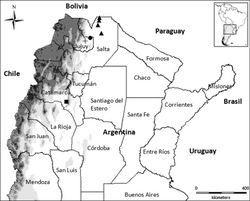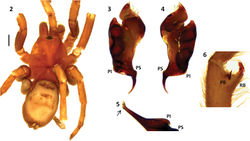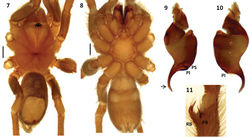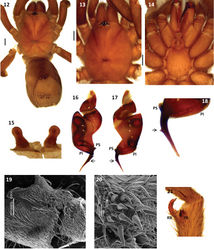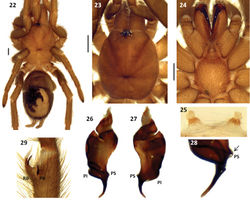Melloleitaoina
| Notice: | This page is derived from the original publication listed below, whose author(s) should always be credited. Further contributors may edit and improve the content of this page and, consequently, need to be credited as well (see page history). Any assessment of factual correctness requires a careful review of the original article as well as of subsequent contributions.
If you are uncertain whether your planned contribution is correct or not, we suggest that you use the associated discussion page instead of editing the page directly. This page should be cited as follows (rationale):
Citation formats to copy and paste
BibTeX: @article{Perafán2014ZooKeys404, RIS/ Endnote: TY - JOUR Wikipedia/ Citizendium: <ref name="Perafán2014ZooKeys404">{{Citation See also the citation download page at the journal. |
Ordo: Araneae
Familia: Theraphosidae
Name
Melloleitaoina Gerschman & Schiapelli, 1960 – Wikispecies link – Pensoft Profile
Type species
Melloleitaoina crassifemur Gerschman & Schiapelli, 1960
Diagnosis
Both sexes have a reduced number of labial cuspules (6–14), all tarsal scopulae divided and metatarsal IV scopulae absent. Males differ from other Theraphosinae by having a thickened femur III, palpal organ with a long and curved embolus with two prolateral keels (PI and PS) (Figs 3–4, 9–10, 16–17 and 26–27), and tibial apophysis with two very unequal branches (Figs 6, 11, 21 and 29). Females differ from other Theraphosinae by having spermathecae with two granulated seminal receptacles with a slight constriction near the apex (Figs 15 and 25) and spiniform setae on promargin of coxae III and IV (Figs 19 and 20). Females have type IV urticating setae while males have III-IV intermediated urticating setae.
Affinities
Melloleitaoina species share with Plesiopelma Pocock, 1901 and Tmesiphantes Simon, 1892, principally by the general morphology of the palpal bulb and tibial apophysis. Melloleitaoina males can be distinguished additionally from those of Plesiopelma by lacking nodule on metatarsi I and having only III-IV intermediated urticating setae. They can be distinguished from Tmesiphantes by having sigillas more rounded, male femur III incrassate and female spermathecae with granulated seminal receptacles and spiniform setae on promargin of coxae III and IV.
Distribution
Northern Argentina. Catamarca, Salta and Jujuy provinces (Fig. 1).
Taxon Treatment
- Perafán, C; Pérez-Miles, F; 2014: Three new species of Melloleitaoina Gerschman and Schiapelli, 1960 (Araneae, Mygalomorphae, Theraphosidae) from northern Argentina ZooKeys, 404: 117-129. doi
Images
|
